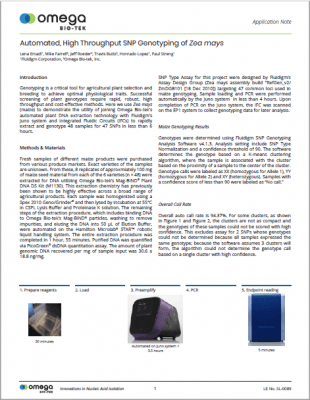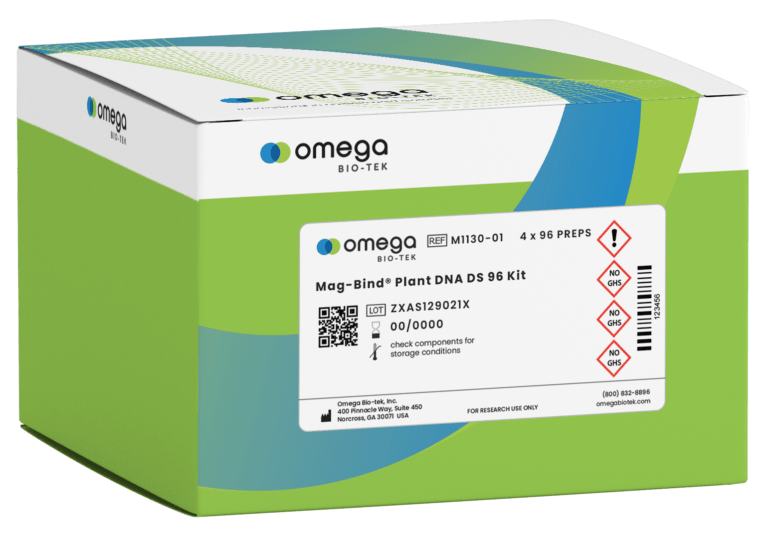Introduction
Methods and Materials
Fresh samples of different maize products were purchased from various produce markets. Exact varieties of the samples are unknown. From these, 8 replicates of approxmiately 100 mg of maize seed material from each of the 6 varieties (n = 48) were extracted for DNA utilizing Omega Bio-tek’s Mag-BIND® Plant DNA DS Kit (M1130). This extraction chemistry has previously been shown to be highly effective across a broad range of agricultural products. Each sample was homogenized using a Spex 2010 Geno/Grinder® and then lysed by incubation at 55°C in CSPL Lysis Buffer and Proteinase K solution. The remaining steps of the extraction procedure, which includes binding DNA to Omega Bio-tek’s Mag-BIND® particles, washing to remove impurities, and eluting the DNA into 50 μL of Elution Buffer, were automated on the Hamilton Microlab® STAR™ robotic liquid handling system. The entire extraction procedure was completed in 1 hour, 55 minutes. Purified DNA was quantified via PicoGreen® dsDNA quantitation assay. The amount of plant genomic DNA recovered per mg of sample input was 30.6 ± 18.8 ng/mg.
Learn more about the Mag-Bind® Plant DNA DS 96 Kit.
SNP Type Assay for this project were designed by Fluidigm’s Assay Design Group (Zea mays assembly build “RefGen_v2/ZmDGB101 [18 Dec 2010]) targeting 47 common loci used in maize genotyping. Sample loading and PCR were performed automatically by the Juno system in less than 4 hours. Upon completion of PCR on the Juno system, the IFC was scanned on the EP1 system to collect genotyping data for later analysis.
Maize Genotyping Results
Genotypes were determined using Fluidigm SNP Genotyping Analysis Software v4.1.3. Analysis setting include SNP Type Normalization and a confidence threshold of 90. The software determines the genotype based on a K-means clustering algorithm, where the sample is associated with the cluster based on the proximity of a sample to the center of the cluster. Genotype calls were labeled as XX (homozygous for Allele 1), YY (homozygous for Allele 2) and XY (heterozygous). Samples with a confidence score of less than 90 were labeled as “No call.”
Overall Call Rate
Overall auto call rate is 94.37%. For some clusters, as shown in Figure 1 and Figure 2, the clusters are not as compact and the genotypes of these samples could not be scored with high confidence. This excludes assay for 2 SNPs whose genotypes could not be determined because all samples expressed the same genotype; because the software assumes 3 clusters will form, the algorithm could not determine the genotype call based on a single cluster with high confidence.


Concordance Between Technical Replicates
Concordance between the 2 technical replicates of each sample on the IFC is 96.64%. Discordant calls were traced to one of the two replicates labeled as a “No call” by the software because of the slightly lower confidence score.
Homogeneous Genotypes
Of the 47 SNPs evaluated in this panel, 30 generated the same genotype call in all 6 varieties of maize. Gene IDs for these SNPs are included in Table 1. A call map of each genotype is included in Figure 3.
Diverse Genotypes
14 SNPs resulted in a diverse range of genotypes across the 6 varieties of maize. Gene IDs for these SNPs are included in Table 2. Call maps of each genotype is included in Figure 4.


Note that a few samples amplified, but the final genotype call was ambiguous and could not be determined accurately by the software (Figure 5). We believe that these SNPs are particularly difficult to genotype because of the complexity of the maize genome, which is replete with chromosome duplications and repetitive regions and may result in a second copy at another position in the maize genome (2). Because of this, it is possible to observe a more broad cluster phenotype where the final call cannot be determined with high confidence. With a larger sample cohort and a more sophisticated confidence genotype call algorithm, it may be possible to determine the genotypes of these failed samples. Here, we report only the genotype calls with the highest confidence.

Conclusions
Omega Bio-tek’s Mag-BIND® Plant DNA DS Kit (M1130) extracts high quality genomic DNA from maize in less than 2 hours. The amount of plant gDNA recovered per mg of sample input was 30.6 ± 18.8 ng/mg. With Fluidigm’s Juno system and Integrated Fluidic Circuits (IFCs), it is possible to genotype 96 samples for 96 SNPs in less than 6 hours.
Here, we’ve evaluated 47 common loci across 6 varieties of maize using SNP Type Assays. 30 SNPs were homogeneous for all samples, 14 SNPs were found to be highly polymorphic.
Overall autocall rate is 94.37% with 96.64% concordance between genotype calls of technical replicates.

References
[1]. Omega Bio-tek (2015) Rapid, high performance and cost-effective plant DNA extractions. [2]. Ganal, MW, et al. (2011). A large maize SNP genotyping array: Development and germplasm genotyping, and genetic mapping to compare with the B73 reference genome. PLoS ONE 6(12):e17224. doi: 10.1371/journal.pone.0028334.


